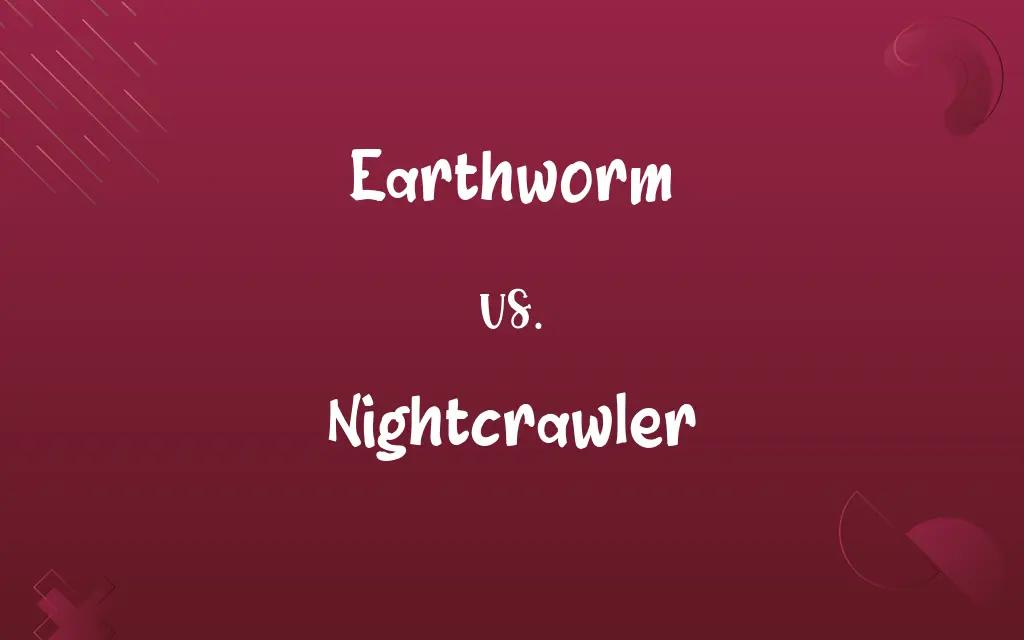Earthworm vs. Nightcrawler: Know the Difference

By Dua Fatima & Shumaila Saeed || Published on May 16, 2024
Earthworms are soil-dwelling worms beneficial for aeration and composting, while nightcrawlers, a type of earthworm, are larger and favor cool, moist soil.

Key Differences
Earthworms, broadly referring to various species within the oligochaete class, are crucial for soil health, promoting aeration and nutrient cycling. Nightcrawlers, specifically Lumbricus terrestris, are known for their size and ability to burrow deeply, enhancing soil structure and fertility.
Dua Fatima
May 16, 2024
All earthworms contribute to breaking down organic matter, nightcrawlers are particularly noted for their surface night activity, dragging leaves into their burrows to feed. This behavior contrasts with other earthworms that might feed within the soil or on the surface without significant burrowing.
Shumaila Saeed
May 16, 2024
Earthworms are often found in diverse environments ranging from gardens to forests, thriving in moist, rich soil. Nightcrawlers prefer cooler and moist conditions, making them less common in arid or very warm climates.
Dua Fatima
May 16, 2024
In terms of gardening and composting, general earthworm activity is beneficial for decomposing organic waste and improving soil health. Nightcrawlers, due to their deep burrowing, play a specific role in enhancing soil drainage and aeration.
Dua Fatima
May 16, 2024
Fishermen value both earthworms and nightcrawlers as bait due to their movement and size. However, nightcrawlers are often preferred for their larger size and durability in water, attracting a wider variety of fish.
Hifza Nasir
May 16, 2024
ADVERTISEMENT
Comparison Chart
Habitat
Diverse, including gardens and forests
Prefer cool, moist soil, less common in arid areas
Shumaila Saeed
May 16, 2024
Feeding Behavior
Feed on soil and organic matter
Drag leaves and organic matter into burrows
Dua Fatima
May 16, 2024
Soil Contribution
Aeration, nutrient cycling, composting
Deep burrowing enhances drainage and aeration
Hifza Nasir
May 16, 2024
ADVERTISEMENT
Earthworm and Nightcrawler Definitions
Earthworm
Beneficial for gardens and natural ecosystems.
Gardeners often introduce earthworms to boost plant growth.
Dua Fatima
Mar 01, 2024
Nightcrawler
Nightcrawlers are large earthworms known for deep burrowing.
Nightcrawlers can be found on the soil surface at night.
Dua Fatima
Mar 01, 2024
Earthworm
Smaller earthworms serve as essential food for wildlife.
Birds often hunt for earthworms to feed their young.
Shumaila Saeed
Mar 01, 2024
Nightcrawler
Prefer cool, moist conditions and are active at night.
After rain, nightcrawlers emerge to feed and mate.
Dua Fatima
Mar 01, 2024
Earthworm
Earthworms enhance soil health by aerating and composting.
Earthworms were added to the garden to improve soil quality.
Dua Fatima
Mar 01, 2024
ADVERTISEMENT
Nightcrawler
Highly valued by fishermen for bait.
Nightcrawlers are often used as bait due to their size and movement.
Dua Fatima
Mar 01, 2024
Earthworm
They break down organic matter, enriching soil.
The presence of earthworms indicates healthy, fertile soil.
Shumaila Saeed
Mar 01, 2024
Nightcrawler
They improve soil structure and fertility.
Nightcrawlers play a key role in creating deeper soil channels.
Hifza Nasir
Mar 01, 2024
Earthworm
Earthworms are versatile, adapting to various environments.
Earthworms thrive in moist, decomposing leaves.
Dua Fatima
Mar 01, 2024
Nightcrawler
Their burrowing habits significantly benefit soil aeration.
The garden’s drainage improved thanks to the nightcrawlers.
Shumaila Saeed
Mar 01, 2024
Earthworm
Any of various terrestrial annelid worms of the class Oligochaeta, especially those of the family Lumbricidae, that burrow into and help aerate and enrich soil.
Dua Fatima
Mar 01, 2024
Nightcrawler
Any of various large earthworms that dig deep burrows in the ground and emerge at night. They are often used as fish bait.
Dua Fatima
Mar 01, 2024
Nightcrawler
An earthworm of the species Lumbricus terrestris, known for its large size and nocturnal surfacings.
Dua Fatima
Mar 01, 2024
Earthworm
A worm of the family Lumbricidae, or, more generally, of the suborder Lumbricina.
Dua Fatima
Mar 01, 2024
Nightcrawler
More generally, any arbitrarily large earthworm, especially those favored in angling.
Dua Fatima
Mar 01, 2024
Earthworm
Any worm of the genus Lumbricus and allied genera, found in damp soil. One of the largest and most abundant species in Europe and America is L. terrestris; many others are known; - called also angleworm and dewworm.
Dua Fatima
Mar 01, 2024
Nightcrawler
A terrestrial worm that burrows into and helps aerate soil; an earthworm. It often surfaces when the ground is cool or wet, and is used as bait by anglers. The term is used mostly in the northern and western U. S.
Shumaila Saeed
Mar 01, 2024
Earthworm
Terrestrial worm that burrows into and helps aerate soil; often surfaces when the ground is cool or wet; used as bait by anglers
Dua Fatima
Mar 01, 2024
Nightcrawler
Terrestrial worm that burrows into and helps aerate soil; often surfaces when the ground is cool or wet; used as bait by anglers
Dua Fatima
Mar 01, 2024
Repeatedly Asked Queries
Why are earthworms important for gardens?
They improve soil structure, aeration, and nutrient content by breaking down organic matter.
Dua Fatima
May 16, 2024
Can you find nightcrawlers during the day?
Rarely, as they are primarily active at night and stay in their burrows during the day to avoid dry conditions and predators.
Hifza Nasir
May 16, 2024
What distinguishes nightcrawlers from other earthworms?
Nightcrawlers are larger, prefer cooler and moist conditions, and are known for their deep burrowing and surface feeding habits.
Dua Fatima
May 16, 2024
How do nightcrawlers benefit the soil?
By burrowing deeply, they enhance soil drainage and aeration, contributing to a healthier soil ecosystem.
Shumaila Saeed
May 16, 2024
Are all earthworms beneficial for composting?
Yes, most earthworm species contribute positively to composting by breaking down organic waste into nutrient-rich soil.
Dua Fatima
May 16, 2024
What are earthworms?
Earthworms are soil-dwelling invertebrates that play a crucial role in soil health and nutrient cycling.
Shumaila Saeed
May 16, 2024
How do earthworms reproduce?
Earthworms are hermaphrodites, with each individual possessing both male and female reproductive organs, allowing for mutual fertilization.
Dua Fatima
May 16, 2024
Why are nightcrawlers preferred as fishing bait?
Their larger size and vigorous movement attract more fish and make them more durable in water.
Hifza Nasir
May 16, 2024
What conditions do earthworms thrive in?
They thrive in moist, nutrient-rich soil with adequate organic material.
Dua Fatima
May 16, 2024
Can nightcrawlers survive in dry soil?
They can survive by burrowing deep into the soil to reach moister layers but prefer naturally moist conditions.
Dua Fatima
May 16, 2024
What makes nightcrawlers unique among earthworms?
Their size, burrowing depth, and preference for surface feeding at night differentiate them from other earthworm species.
Dua Fatima
May 16, 2024
How can you encourage earthworms in your garden?
Maintain moist, rich soil with plenty of organic matter for them to feed on.
Hifza Nasir
May 16, 2024
What is the lifespan of a nightcrawler?
Nightcrawlers can live up to several years under optimal conditions.
Shumaila Saeed
May 16, 2024
Do earthworms have any natural predators?
Yes, birds, rodents, and some insects prey on earthworms, including nightcrawlers.
Shumaila Saeed
May 16, 2024
Are nightcrawlers good for all types of gardens?
While beneficial for soil health, their deep burrowing might not be suitable for all plant types, especially those with shallow root systems.
Hifza Nasir
May 16, 2024
Share this page
Link for your blog / website
HTML
Link to share via messenger
About Author
Written by
Dua FatimaCo-written by
Shumaila SaeedShumaila Saeed, an expert content creator with 6 years of experience, specializes in distilling complex topics into easily digestible comparisons, shining a light on the nuances that both inform and educate readers with clarity and accuracy.









































































